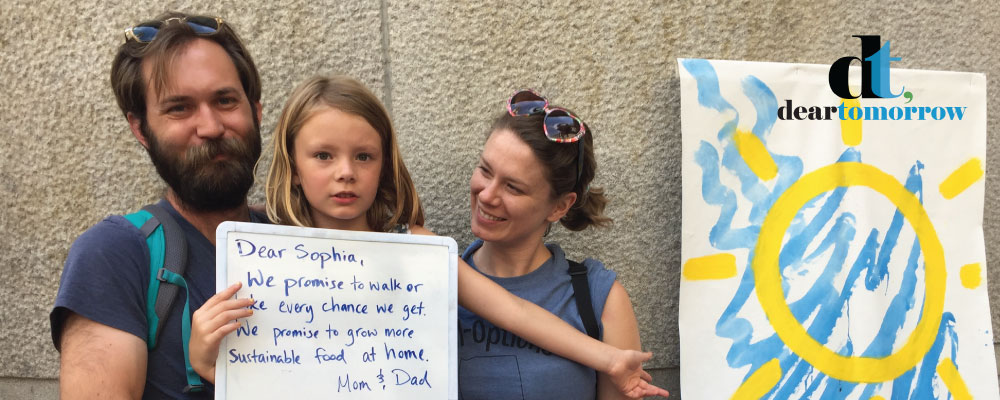Description
DearTomorrow is a digital platform and long-term archive where people publicly share letters, photos and videos addressed to their kids, family or future selves about how they think about climate change, why it’s important and what actions they will take to address climate change. All messages are shared on deartomorrow.org and selected messages are amplified through social platforms, traditional media, videos and public art projects.
DearTomorrow addresses the psychological disconnect by connecting climate change to the personal identities and values that people share across political and social boundaries: parental responsibility, family, and legacy. We offer a personal, hopeful and action-oriented framing for people to connect to climate change, publicly commit to taking stronger personal action and share these stories with their friends, family, community and social networks.
Our design includes best practices in behavior science and climate change communications, including the use of narrative storytelling and visual imagery, creating social norms and relying on trusted messengers (close friends and family, leaders within various communities) who use their own voice and messages to reach their social networks. The project’s focus and design allow us to reach environmentalists and non-environmental alike and work across various communities, including parents, students, and faith-based communities.
DearTomorrow works in collaboration with dozens of US-based partners and co-founded Our Kids’ Climate, an international network of parents organizing for climate action. DearTomorrow has been recognized by MIT Climate Co-Lab, Vox, and 2017 Grist 50 and co-founder Jill Kubit was invited to speak at TED Headquarters in NYC.
Objectives and beneficiaries
For many, climate change is characterized as overwhelming, distant and highly polarized. There is a pervasive culture of climate silence where people do not discuss climate change in their everyday lives. As a result, the movement has struggled to build the political and social will necessary to create meaningful change. Drawing from other successful movements, we believe that we must use a broader moral lens to elevate climate change. DearTomorrow is helping to grow the movement beyond traditional environmentalists by focusing on the personal and moral responsibility to act. The idea is simple: we must talk about climate change from a place of love, legacy, and hope.
DearTomorrow’s framework empowers individuals to engage their friends, family and social networks in a personal, non-political way. Additionally, we partner with community influencers and non-profit partners in parents, students, and faith-based communities to deepen their communication and engagement strategies.
Strong points of the solution
DearTomorrow’s platform is a space to share and elevate personal, hopeful messages and think differently about climate change to inspire new thinking and action. Through the platform, we aim to change the public narrative on climate change, empower and equip participants with the tools and best practices to be effective climate communicators, create a new model for creative, participatory engagement, and improve the field’s understanding for measuring the impact of art and narrative projects.
Our distributed partnership model provides a framework for NGOs and individuals to engage their own communities and social networks. We utilize best practices in behavior science and climate communications including developing narrative storytelling, creating visual imagery, constructing social norms, and utilizing trusted messengers. A strong body of research supports this model: Shrum 2016; Zaval et al 2015; Pahl and Bauer 2013; Arnocky 2014; Doherty & Webler 2016.
Expected results and benefits for climate change adaptation and mitigation
DearTomorrow’s goal is to elevate personal stories of hope, legacy, and love to drive meaningful actions both to mitigate and adapt to climate change through policy change, individual actions and corporate responsibility. To win major policy breakthroughs and achieve large-scale changes in behavior and social norms, we must shift the public narrative on climate change. Our research indicates that talking about climate change in a way that is personal and relevant to one’s peers can unleash climate solutions on a large scale. We track levels of engagement of both personal engagement of an individual’s promise (installing solar, energy conservation, food choices, etc.) and engagement with decision makers to reduce greenhouse gas emissions and invest in renewable energy. Our goal is to collect 10,000 personal letters, photo pledges, and videos by 2020 with a reach of 20 million people worldwide.
Scalability potential of the solution
DearTomorrow’s partnership model and digital platform allow for growth and scale. Through our distributed partnership model, DearTomorrow serves as the main idea, digital hub, and curator, while individuals and organizations collect and distribute messages within their own communities. Working with dozens of partners in the US and globally, we’ve been able to recruit new participants and share our message without building a large infrastructure or duplicating the work of organizations on the ground. Through our digital toolkit, we have empowered teachers and community members to organically carry out DearTomorrow. We specifically designed our main activity, the creation of letters, photos and videos, so that it can be done using readily available materials (phone, computers) at little or no additional cost. To date, DearTomorrow has received promises from more than 50 countries and has seen organic growth through volunteer-led initiatives in 11 US states, the UK, Taiwan, and France.
[Editor's Note: All information published as submitted by the author(s). Minor edits may have been made for length and clarity.]






